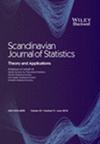A classical hypothesis test for assessing the homogeneity of disease transmission in stochastic epidemic models
IF 1
4区 数学
Q3 STATISTICS & PROBABILITY
引用次数: 0
Abstract
This paper addresses the problem of assessing the homogeneity of the disease transmission process in stochastic epidemic models in populations that are partitioned into social groups. We develop a classical hypothesis test for completed epidemics which assesses whether or not there is significant within‐group transmission during an outbreak. The test is based on time‐ordered group labels of individuals. The null hypothesis is that of homogeneity of disease transmission among individuals, a hypothesis under which the discrete random vector of groups labels has a known sampling distribution that is independent of any model parameters. The test exhibits excellent performance when applied to various scenarios of simulated data and is also illustrated using two real‐life epidemic data sets. We develop some asymptotic theory including a central limit theorem. The test is practically very appealing, being computationally cheap and straightforward to implement, as well as being applicable to a wide range of real‐life outbreak settings and to related problems in other fields.用于评估随机流行病模型中疾病传播同质性的经典假设检验
本文探讨了在随机流行病模型中评估疾病传播过程的同质性问题。我们为已完成的流行病开发了一种经典的假设检验,用于评估疫情爆发期间是否存在显著的群体内传播。该检验基于时间排序的个体群体标签。零假设是疾病在个体间传播的同质性,即群体标签的离散随机向量具有与任何模型参数无关的已知抽样分布。该检验在应用于各种模拟数据场景时表现出卓越的性能,我们还使用两个真实的流行病数据集对其进行了说明。我们提出了一些渐近理论,包括中心极限定理。该检验实际上非常吸引人,计算成本低,实施简单,适用于广泛的现实生活中的疫情爆发环境和其他领域的相关问题。
本文章由计算机程序翻译,如有差异,请以英文原文为准。
求助全文
约1分钟内获得全文
求助全文
来源期刊

Scandinavian Journal of Statistics
数学-统计学与概率论
CiteScore
1.80
自引率
0.00%
发文量
61
审稿时长
6-12 weeks
期刊介绍:
The Scandinavian Journal of Statistics is internationally recognised as one of the leading statistical journals in the world. It was founded in 1974 by four Scandinavian statistical societies. Today more than eighty per cent of the manuscripts are submitted from outside Scandinavia.
It is an international journal devoted to reporting significant and innovative original contributions to statistical methodology, both theory and applications.
The journal specializes in statistical modelling showing particular appreciation of the underlying substantive research problems.
The emergence of specialized methods for analysing longitudinal and spatial data is just one example of an area of important methodological development in which the Scandinavian Journal of Statistics has a particular niche.
 求助内容:
求助内容: 应助结果提醒方式:
应助结果提醒方式:


